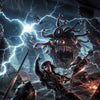Instantly Improve Your D&D Game with This

Written by Luke Hart
What if I told you there was one thing you could do to instantly make your D&D, Pathfinder, or other tabletop RPG game ten times better? Maybe even a hundred times better?
Here’s the thing: most game masters want to run great games—in fact, probably all of them—I bet you do. However, many times, we overcomplicate things. You may think you have to do all of these things to run an amazing game for your players. And, while you can do a lot to improve your game, sometimes the small, simplest things are what matter.
Watch or listen to this article by clicking the video below.
Let me tell you a story. A few years ago, I played in a D&D game that was really unsatisfying, and I couldn’t quite put my finger on why at first. I was there for several sessions, but things just weren’t clicking.
However, I was also a player in a different game, with a different game master, that I really enjoyed. It was after a session in that game that everything slid into place, and I realized what made one game unsatisfying and the other enjoyable.
In game A, the GM constantly had their nose in the book. We were running a module, and they were constantly looking things up. I think they were concerned about running the module exactly as written and not getting any of the details wrong—or they just hadn’t prepared enough in advance. Either way, our game master was AWOL for about half of the game. They were just not there running the game.
Now, that means we players were left to our own devices to keep ourselves entertained. Two of the players were chatterboxes in character and just kept going on and on, talking to each other and the rest of us. Then there were two of us, myself included, who were quieter, and we needed to find other ways to entertain ourselves while we waited for the GM to return from their “research break.” I remember this one time he and I just started moving our minis on the map to unexplored areas, hoping that we would stir up trouble and make things interesting again—at least, that’s what I was doing.
But what was happening is that while the GM had their nose in the book—and it seemed to happen a lot—the game was basically paused, and even though the players were doing stuff, we were mostly just waiting for the GM to un-pause the game. This is like having 5-minute loading screens in a game all the time. They suck. Anyway, this killed pacing and contributed greatly to boredom, at least from my point of view.
However, something else was also going on sometimes. You see, when a player declares an action, it falls to the game master to adjudicate that action. But in this game, multiple players would declare actions back-to-back without allowing the game master time to resolve any of them. So, we would end up with three declared actions; the GM would resolve one, and then another player would declare an action, adding it to the queue. The GM would start resolving another, and then another action would be added. Then, when the GM forgot a declared action, the player reminded them—it was pure chaos at times.
OK, now contrast that game with the other game. In Game B, the game master did not have their nose in a book much at all. They had clearly prepared adequately in advance and improvised as needed to avoid having to look things up. The result was a game that was rarely paused or had a dreaded loading screen.
Furthermore, the game master insisted on adjudicating declared actions as they came up. When another player tried to sneak another action in, the GM politely interrupted them and asked that they wait for just a moment while they resolved the first action. Then, after the GM resolved the first action, they pinged the second player for what they wanted to do. This resulted in a much more orderly, smooth game that lacked the chaos of Game A.
By the way, the fact that the GM was actually running the game and wasn’t looking things up resulted in them being able to resolve actions as they came up. I forgot to mention this, but one thing that happened in Game A is that when we were on a loading screen, that didn’t stop players from stating they were going to do things. So, when the GM un-paused the game, they often had a queue of actions waiting to be adjudicated. It was a death spiral!
Now, you’re probably asking yourself, what was the one thing game master B was doing that game master A wasn’t? He was running a smooth game. Running a smooth game can be the difference between a crappy game and an amazing game.
Now, here are three things you can do to run a smooth game.
#1 Stop Looking Things Up!
This means three things: First, do your best to learn the rules so you don’t need to look things up during the game. Second, if you are running a module—or even homebrew—adequately prep your adventure so you don’t need to look things up. Third, if a rule question comes up that you don’t have the answer to, or you don’t remember a detail from the adventure—improvise! The bottom line is to limit how much you look things up.
#2 Keep Things Moving
Moving the game along isn’t just about not pausing the game or avoiding loading screens; it is about keeping the story and the action moving forward. Here are the top two things that kill pacing in my experience: First, endless player discussions about what to do. Second, committee discussions during combat on every player’s turn. This is when the entire table discusses what a player should do on their turn, for every single player, on every single turn, thus turning combat into a tactical slog. Sure, you may 100% optimize every combat, but that usually comes at the cost of fun.
To fix combat timing, give players about 5 minutes to discuss “what to do next” or “how to do a thing,” but then request a decision and be firm about it. Next, in combat, give players one minute at the start of each round to discuss tactics for that round, but then, during players’ individual turns, do not allow tactic discussions. I do this by politely interrupting when a player begins to do this. I usually say something like, “I’m sorry, but let’s avoid tactic discussions during the round and instead have them at the start of the round.” That’s usually enough to keep things moving. It only takes a couple of corrections like that, and players stop doing it.
#3 Control the Chaos
I was in a completely chaotic group once, and when I brought it up, one of the players quipped, “All groups are like this. You get used to it.” No, no, they are not. Not all games are like that. Players talking over each other, not respecting each other, not respecting the game master or allowing them to run the game—no. Your group doesn’t need to be like that. Assert your authority as a game master and keep things to a dull roar. In my games, we all still have fun, but the environment is one of control, not chaos . . . most of the time.
So, how do you control the chaos? First, ask players not to talk over each other, especially if you’re playing online. Second, ask players to wait for you to adjudicate one player’s action before they declare an action they’d like to do. Third, make sure you’re giving all players the chance to participate—usually by calling on them—and don’t allow the talkative players to dominate the game.
100 Years of GM Experience at Your Fingertips!
Are you a NEW GAME MASTER feeling a bit overwhelmed by everything involved with running a role-playing game? Are you a VETERAN GAME MASTER looking for new tips and tricks to take your games to the next level? Look no further than the Secret Art of Game Mastery.
We at the DM Lair have distilled our CENTURY of accumulated GM experience into an easy-to-read guide of practical advice that you can immediately apply to your games! We've even included our own templates–the things that we use to prepare our ACTUAL games.
Get all three books to master your game:
- The Secret Art of Game Mastery. Contains over 100 years of GM advice distilled into an easy-to-read format. It introduces and explains the tools of the trade, scheduling, playstyle, post-game notes, getting player feedback, and more.
- The Secret Art of Preparation. Brings to your fingertips the actual templates and guides that the DM Lair team uses to prepare games, Lair Magazine, and more. Designed as a three-ring binder, it's intended for you to write directly into for your entire campaign!
- The Secret Art of Notetaking. Gives you the keys to tracking your campaign from session to session just like the DM Lair team. Designed as a three-ring binder, it's intended for you to write in and keep track of your whole campaign!
With so much knowledge and experience on its pages, The Secret Art of Game Mastery is guaranteed to become an indispensable tool for all game masters, new and veteran alike. And if that isn’t enough, the information applies to all game systems and all genres!
-
Posted in
Game Master How-To Articles







